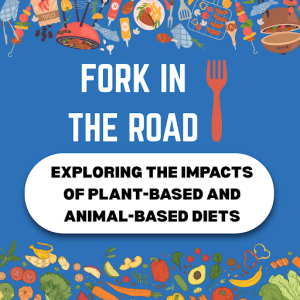Fork in the Road: Exploring the Impacts of Plant-Based and Animal-Based Diets
By Allis Emmet, C2ST Intern, DePaul University
In the past decade or so, plant-based diets have shifted from niche to mainstream. Oat milk, cauliflower wings, Green Goddess salads, Beyond Beef— and the list goes on. But what is motivating this trend? In the U.S., our food production takes up a massive amount of our natural resources—50% of our land, 80% of our fresh water, and 17% of our fossil energy. While this includes all forms of agriculture, the meat and dairy industries use the most resources by far. The majority of cropland in the U.S. is used to grow food for livestock, not people. Any clue how many livestock are bred in the U.S. each year? The yearly livestock population is around 9 billion, which weighs 5 times as much as the U.S. human population! In effect, animal agriculture requires an abundance of energy yet yields less in comparison to plants.

As the global population increases and climate change continues, many researchers warn that prioritizing the meat and dairy industries may lead to environmental challenges. In response, plant-based foods have gained attention. If you eat fruits, vegetables, beans, nuts, legumes, and grains, you are familiar with the building blocks of a plant-based diet. Plant-based eating doesn’t necessarily have to mean vegetarian or vegan, although it can. Animal products such as fish, poultry, and low-fat dairy can also be included as part of a plant-based diet based on one’s preferences.
Plant-based diets have environmental benefits, and early research shows potential for improved health outcomes. On the environmental side, a study in California found that eating vegetarian uses 2.9 times less water, 2.5 times less natural energy, 13 times less fertilizer, and 1.4 times less pesticides. Additionally, the production of plant protein requires 11 times less fossil energy than animal protein. In terms of health, plant-based diets have been related to a lower risk of chronic diseases and some cancers. In the past decade, there has been an increase in research linking eating plant-based foods to a reduction in cardiovascular disease, specifically.
If a plant-based diet is better for the environment and has health benefits, why is everyone not rushing to stock their shelves? A barrier to plant popularity is that meat is the expected “centerpiece” in the American diet. As plant-based foods have gained traction within American culture, so has the “carnivore diet,” which involves eating only animal products. Celebrities like Joe Rogan, who has the #1 podcast in America, have contributed to this diet’s popularity. Many eat meat because it is a source of important nutrients, like vitamin B12, iron, and protein. This may be especially important for those with nutrient deficiencies or special dietary needs. Also, some individuals prefer how they feel on animal-based diets, or it may be what is most accessible and affordable to them. While meat plays a major role in Western eating patterns, many people around the world eat much less meat or none, due to cultural or economic factors.
So, where does the U.S. general public stand? Advocates and research groups alike continue to discuss public opinion as well as best practices. According to a new Physicians Committee for Responsible Medicine (PCRM) survey, 65% of adults say they would be open to trying a plant-based diet, especially for health reasons. PCRM is a prominent advocate for plant-based eating, strongly promoting veganism in its outreach. While the USDA Agricultural Research Service (ARS) views plant-based approaches as an option for some, it emphasizes caution for children/teenagers, the elderly, and pregnant individuals, especially when considering veganism. As a neutral research agency, they recommend that all individuals plan and supplement carefully to maintain proper nutritional recommendations. Despite debate and differing opinions, curiosity and interest in plant-based possibilities remain.
References
- https://www.sciencedirect.com/science/article/pii/S0002916522033706
- https://www.sciencedirect.com/science/article/pii/S0002916523048992
- https://ajcn.nutrition.org/article/S0002-9165(23)23847-2/fulltext
- https://ehp.niehs.nih.gov/doi/epdf/10.1289/ehp.02110445
- https://www.sciencedirect.com/science/article/pii/S2161831322002150
- https://www.pcrm.org/news/news-releases/half-us-adults-acknowledge-health-benefits-eating-plant-based-diet
- https://www.sciencedirect.com/science/article/pii/S2475299122106086
- https://www.ars.usda.gov/news-events/news/research-news/2022/scientist-evaluates-dietary-food-patterns-for-healthy-adults-eating-dairy-free-vegetarian-or-vegan-diets/
- https://jn.nutrition.org/article/S0022-3166(22)00711-8/fulltext
- https://www.sciencedirect.com/science/article/pii/S000291652203355X
- https://www.sciencedirect.com/science/article/pii/S0309174016301012